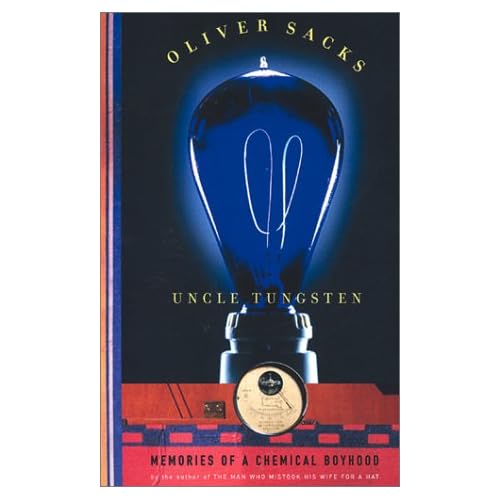Serendip is an independent site partnering with faculty at multiple colleges and universities around the world. Happy exploring!
Personal Chemistry: Reading Uncle Tungsten

Brought to you by The Slippery Brain Sodality
A few excerpts...
"My history and geography as a boy, the history and geography that moved me, was based more on chemistry than on wars or world events. I followed the fortunes of the early chemists more closely than the fortunes of the contending forces in the war...” (Ch. 6: The Land of Stibnite)
"[The] scientists, the early ch emists, whom I read about became, in a sense, honorary ancestors, people to whom, in fantasy, I had a sort of connection. I needed to understand how these early chemists thought, to imagine myself into their worlds.” (Ch. 10: A Chemical Language)
emists, whom I read about became, in a sense, honorary ancestors, people to whom, in fantasy, I had a sort of connection. I needed to understand how these early chemists thought, to imagine myself into their worlds.” (Ch. 10: A Chemical Language)




Comments
initial reactions
I only got about 3/4 of the way through this so there may be some important stuff I missed but, nonetheless, I really enjoyed reading what I did. The quote that I brought up in our discussion was:
"I wanted to understand, to master for myself, all the processes involved, and to manipulate them in my own way." (Ch 12: Images, pg 136)
I think it was this characteristic of Sacks that drew me to the book. As a kid (and probably now, judging from his other books) he seemed to have this intense curiosity, a desire, possibly a need, to understand everything in such intricate detail and to see how it connected to everything else he knew. I think I can identify with this tendency, I often feel like I want or need to know every possible thing there is to know about something, or when learning about something, I often get drawn on a tangent learning all I can about something. I think this tendency to go off on a tangent is evident in Sacks by his frequent use of footnotes.
First impressions
Fellow readers are invited to use this space is to record your initial response(s) to Uncle Tungsten, what you liked or disliked, what caught your attention, what spoke to you, what quotes you would deem representative...
points of connection
I was struck by Sacks' intense interest in and deep appreciation for relationships between numbers, chemical elements, electrons and atoms, his very personal connection to natural phenomena. I found myself frustrated by the amount of attention he devoted to detailing his chemical discoveries and tracing his chemical ancestry, so to speak, and I lit up inside every time I came to a passage in which Sacks offered glimpses of his interpersonal experiences and relationships with living people. Rather than criticizing Sacks (which was, I think, the initial impulse), I turned that frustration on myself, figuring he must have good reason to go on and on about things to which I could not relate, and that if only I had a better foundation in the natural sciences, I too would be able to see what he saw. It was important to me to preserve a sense of connection to him, and I suppose finding fault with myself served that purpose. Then, perhaps in an effort to defend myself, I began to wonder, might there be a parallel between my inability to understand/appreciate the phenomena he cared so much about and the difficulty that someone with autism experiences vis-à-vis social phenomena? This notion created a bridge of sorts, and had the added advantage of validating both his experiences and mine.